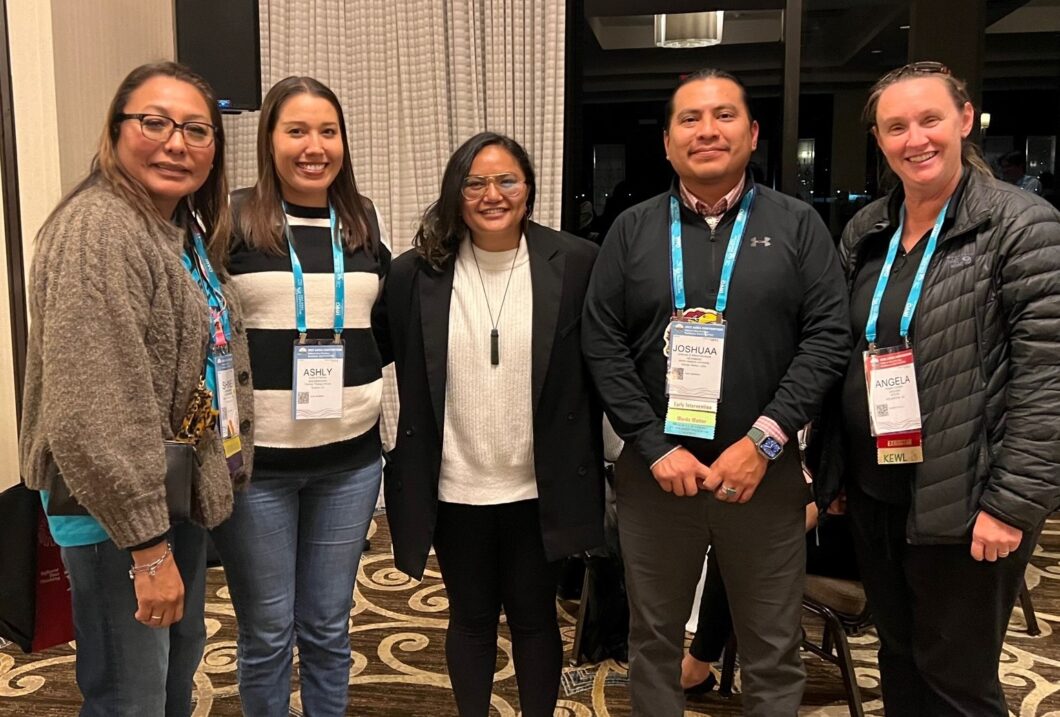Pictured: members of the Native American Caucus
The Native American Caucus of Speech-Language Pathology and Audiology was established in 1986 with the purpose of increasing and improving quality speech, language, and hearing services to Indigenous people who have communication disorders.
While the specific Caucus objectives have evolved over the years, the Caucus regularly works to increase the number of Native American speech-language pathologists (SLPs) and audiologists (AuD) serving Indigenous Nations. With over 570 federally recognized tribes and even more state recognized tribes, the Native American Caucus also advocates for the provision of culturally responsive and culturally relevant services to these Nations and their citizens/people. Check out this video to learn more about Caucus members and students.
The Native American Caucus is open to Native American SLPs, AuDs, and other related professionals, as well as allies who support the purpose and mission of the Caucus. The Caucus holds quarterly, caucus-wide, virtual meetings, distributes a quarterly newsletter, and provides opportunities for leadership positions within the Caucus. They held a hybrid meeting at the American Speech-Language-Hearing Association’s Annual Convention in Boston with a Zoom option.
Caucus membership is free. If you would like to join and participate in the Caucus, please contact Matt Gillispie (wmg@ku.edu) and they will add you to their distribution list.
Caucus Member Articles and Resources
In the past several years, Caucus members have authored several articles on serving Native American clients/patients. Check out these recent articles authored by Native American Caucus members and allies:
- Allison-Burbank, J. & Reid, T. (2023). Prioritizing connectedness and equity in speech-language services for American Indian and Alaska Native children. Language, Speech, and Hearing Services in Schools, 44(01), 1-7. https://doi.org/10.1044/2022_LSHSS-22-00101
- Guiberson, M. & Vining, C.B. (2023). Language and Literacy Strategies for Indigenous Children: A Scoping Review. Seminars in Speech and Language, 44(01), 26-41. https://doi.org/10.1055/s-0042-1758802
- Vining, C. B., & Guiberson, M. (2021). Issue editor foreword: Enhancing language services to Native American children: A look from the inside. Topics in Language Disorders, 41(2), 133-139. https://doi.org/10.1097/TLD.0000000000000250
- Henderson, D. (2021). Navajo: A dynamic assessment clinical tutorial. Topics in Language Disorders, Vol. 41(2), pp. 140-152. DOI: 10.1097/TLD.0000000000000248
- McConnell, G.E. & Loeb, D. (2021). Production of narratives of at-risk American Indian children in the Midwest. Topics in Language Disorders, Vol. 41(2), pp. 153-169. DOI: 10.1097/TLD.0000000000000252
- Ferris, K.P., Guiberson, M. & Bush, E.J. (2021). Native American caregivers’ developmental priorities for young children: Implications for intervention. Topics in Language Disorders, Vol. 41(2), pp. 170-185. DOI: 10.1097/TLD.0000000000000247
- Gillispie, M. (2021). Culturally responsive language and literacy instruction with Native American children. Topics in Language Disorders, Vol. 41(2), pp. 186-199. DOI: 10.1097/TLD.0000000000000249
- Multiple articles and authors (March 2016). Culturally Responsive Practices with Native American Communities, ASHA Perspectives SIG 14, Vol. 1(Part 2), March 2016, pp. 42–86.
ASHA’s Native American Caucus would like to thank National NSSLHA’s Inclusion, Diversity, Equity, and Action (IDEA) Work Group for highlighting our Caucus and Indigenous people in the month of November. We also encourage NSSLHA and ASHA members to continue learning about the cultural, linguistic, and historical diversity of Native Americans throughout the year so that members can partner with these communities to harness community contributions and address community needs within healthcare and education.

